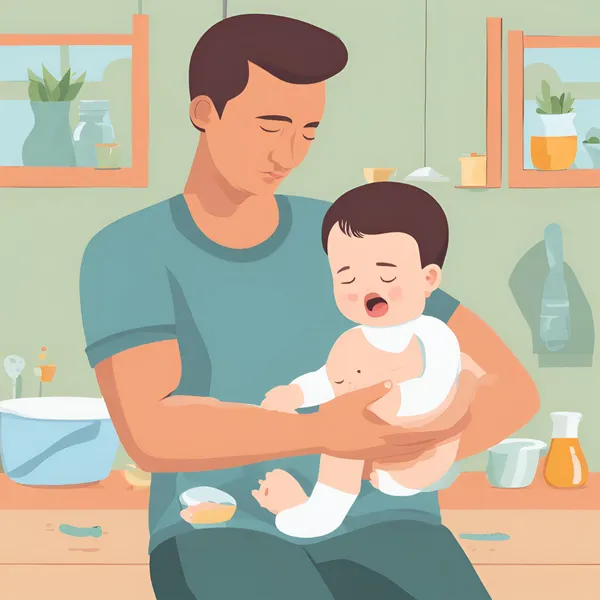What to do if the baby is constipated: Signs, Causes, and Relief Strategies
This is especially so since constipation in babies is generally rare but can be quite a cause for concern. Even slight variations in bowel habits are usual in young infants, but constipation may pose challenges to both the baby and the caregivers after some time. This article provides a comprehensive overview of baby constipation, covering its signs, potential causes, effective relief strategies, and when to seek professional medical advice.
What to do if the baby is constipated

Simple details about regular bowel movements for babies at different ages should not be a mystery. Some breastfed babies may have frequent bowel movements after every feed, while others may only have one once a week, most during the first months or days of life. This is perfectly normal as long as the stool is soft. Stool softening is a common side effect of many laxatives. Babies who take formula food tend to have more frequent bowel movements, probably one or more daily.
Signs of constipation in babies include:
Infrequent bowel movements: Less than three bowel movements per week or less, significantly if the bowel movement is associated with pain or blood-stained stool, etc.
Hard, dry stools:
Pellets usually represent complex or shaped like round balls, constipation symptoms.
Straining or pushing:
While some discomfort exists, strenuous defecation, facial expressions, or excessive crying are screened for difficulty.
Blood in the stool:
Very occasionally, you might see small traces of blood because of small cracks (anal fissures) that can occur when you pass a bowel motion.
Decreased appetite:
Gastro-oesophageal reflux may be caused by a delay in the passage of stools, resulting in poor feeding.
Hard abdomen:
The baby’s tummy may look swollen and stiff.
Fussiness and irritability:
Constipation leads to painful defecation and, as such, can make the babies cry a lot.
First, You need to distinguish between physiological changes and true constipation. A breastfed baby who has not had a bowel movement for 3-4 days but then passes loose stools without discomfort is not constipated.
Possible Causes of Constipation in Babies:

Several factors can contribute to constipation in babies:
1. Dietary Changes
This is one of the most typical causes of constipation in babies. The infant’s G.I. tract is also particularly sensitive and quick to change.
Switching from Breast Milk to Formula:
It can be seen that breast milk is more easily digestible, and it is naturally communicated as lactulose. Formula, as a rule, can sometimes be not so beneficial for a child’s digestion because it has a different composition than breast milk – it causes constipation. Proteins and fats in formula differ from those in breast milk; the differentiation changes how the infant processes the food.
Introducing Solid Foods:
This is a drastic change in the diet. This means that the baby’s digestive system suddenly starts facing new challenges with new substances. The human body also naturally secretes foods that are more binding than others.
Low Fiber Intake:
Missing fiber-containing foods like fruits and vegetables after taking solids will result in the formation of hard stools. Fibre swells when ingested and soaked with water, which helps to bulk up the stool.
Early Introduction of Solids:
Another cause of constipation is too early introducing solids to the baby before the 6-month mark since the digestive system is still inefficient in handling the solids.
Changes in Formula Type:
Changing between brands or types within the formula feeding – cow milk-based, soy-based, hydrolyzed, etc.- can cause temporary gastrointestinal discomfort and constipation.
2. Formula Intolerance or Allergy:
Coordination issues can also develop – as can, albeit less frequently, intolerances and allergies.
- Cow’s Milk Protein Intolerance (CMPI): This is one of the infants’ most frequent pathological reactions. Organ meats are hard on the baby’s digestive system, specifically on the proteins in formula milk prepared from cow’s milk; manifestations entail constipation, diarrhea, vomiting, and skin rashes.
- Soy Allergy or Intolerance: Some babies may also be allergic to soy-based formulas.
- Lactose Intolerance (Rare in Infancy): Although persistent lactose intolerance is prevalent in adults, PLI is exceedingly scarce in infancy. However, secondary lactose intolerance may develop after an infection in the gastrointestinal tract, which sometimes causes temporary constipation.
3. Dehydration:
Stool softening is also dependent on the hydration levels within the body.
- Insufficient Fluid Intake: Suggestive of this is the fact that babies on formula and solids require adequate amounts of fluids to ensure that their stool remains soft. If they deny adequate Fluid Intake, their bodies will try to conserve water by pulling it from the stool, resulting in hard Consistency. This is particularly so whenever the weather is hot or the baby is on the losing side when it comes to fluid loss due to sickness.
- Illness (Fever, Vomiting, Diarrhea): Fever, vomiting, or diarrhea is known to cause dehydration, and since the body is trying to retain fluids at all costs, this results in constipation.
4. Medical Conditions:
- Hirschsprung’s Disease: This impacts the muscle contraction that enables feces to pass through the bowels, hence extreme constipation from birth.
- Hypothyroidism: Constipation may result from an underactive thyroid gland, which slows the body’s metabolic functions, including digestion.
- Cystic Fibrosis: This genetic disorder is related to the defective mucus production.
- Anal Stenosis or Stricture: If the anal opening is small, it may become tight for fecal matter to pass through hence the need for surgery.
- Spinal Cord Abnormalities: Congenital spinal cord malformations often impinge on bowel regulation.
5. Other Factors:
- Family History: Constipation may be hereditary. Even in other family members if they experience constipation, the baby is most likely to be affected, too.
- Emotional Stress: Not rarely does stress influence bowel movements, though it may not be a regular problem in babies of a very tender age.
- Certain Medications: Various medications might cause constipation as one of the side effects.
When to Consult a Doctor:
It’s essential to consult a doctor if your baby:
- Has blood in their stool.
- Is vomiting.
- Has a swollen abdomen.
- He is refusing to eat.
- Suffers from a lack of energy or food intolerance if not fed their regular food.
- Has a fever.
Some pathophysiological manifestations might be due to an undiagnosed chronic disease, which may require medical intervention.
Conclusion:
As constipation is a significant problem in babies, most cases could quickly be dealt with by changing the baby’s diet, getting the baby to exercise, or even massaging him. This article will help the reader notice constipation and distinguish it from simple variations in bowel movement patterns.
However, if you have some doubt if your baby has prolonged constipation or if you notice something worrisome, talk to your pediatrician. You will find that proper care can be administrated early to ensure that your baby is comfortable and okay.


